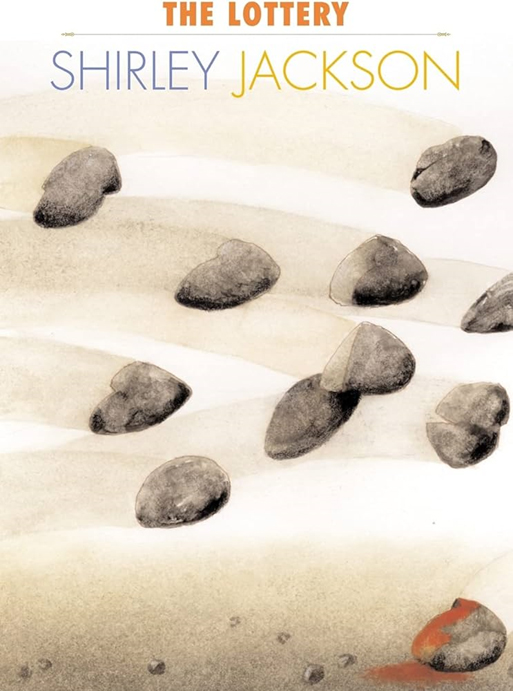“It isn’t fair, it isn’t right”
After a long hiatus from the world of reading, I wanted to ease myself back into the fold with something gradual yet immersive, without feeling overwhelmed. Short stories seemed like the perfect way to start, and what better choice than one of the most critically acclaimed pieces of American literature: The Lottery by Shirley Jackson. I was intrigued by the controversy surrounding its release—after all, what could be so controversial about a ‘lottery’? As I delved into the story, I began to understand the diverse sociological and critical interpretations, along with the various adaptations that followed. The ending was shocking—this wasn’t just any ordinary “lottery,” but something much darker.
Synopsis
Shirley Jackson skilfully sets up a tranquil facade in the opening pages, describing the morning of June 27th with “the fresh warmth of a full-summer day,”. In a small, unnamed village of about 300 people, everyone gathers for the annual lottery. The children arrive first, oddly collecting “the smoothest and roundest stones” and piling them in a corner. Soon, the adults follow—first the men, then the women—all in nervous excitement. Mr. Summers and Mr. Graves had prepared slips of paper the night before, one for each family, placing them in an archaic black box. As the lottery begins, the head of each family draws a slip. Bill Hutchinson draws the marked slip, and his wife Tessie protests, claiming he was rushed. In the final round, Tessie draws the fateful slip. As she cries out about the unfairness of the lottery, the villagers, including her own children—begin to stone her as “Mrs. Hutchinson screamed, and they were upon her.”
Morality vs Blind Tradition
Despite Tessie Hutchinson’s desperate cries against the lottery, she showed no prior disapproval of the tradition. In fact, she hurriedly left her chores, remembering it was “the twenty-seventh,” and laughed with her peers about being late. It wasn’t until her family’s slip was marked that she protested, demanding a rerun. Tessie even suggested her married daughters be included in the draw, revealing her willingness to sacrifice her own children to save herself. Her sudden disapproval exposes her hypocrisy, as her outrage and fear only surfaces when she is personally affected.
While Tessie represents selective morality, only a few, like Mr. Adams, question the tradition. He mentions, “some places have already quit lotteries,” but Old Man Warner, a symbol of blind traditionalism, quickly dismisses the idea, calling them “a pack of crazy fools.” Warner defends the lottery, insisting “there’s always been a lottery,” believing the ritualistic stoning benefits the town. The villagers’ unquestioning belief in this tradition reflects a disturbing prioritisation of tradition over morality.
Conformity
The villagers’ blind conformity to the lottery is evident in their refusal to improve even the simplest aspects of the ritual, like replacing the battered black box, which was “splintered badly” and grew “shabbier each year.” Despite its poor condition and impracticality, the villagers cling to it, even when two people must hold it in place during the draw. Their resistance to change, even as neighbouring villages abandon the lottery, highlights their collective fear of breaking tradition.
This sheep-like mentality is reinforced by figures like Old Man Warner, who mocks the “young folks” for questioning the lottery, saying, “Next thing you know, they’ll be wanting to go back to living in caves.” His words reflect a fear of breaking away from conformity, as if stoning someone to death isn’t already a primitive, stone-age practice. Warner’s influence, combined with societal pressure, keeps the town trapped in this deadly ritual. Ironically, his old age (77) is seen by the villagers as proof that the lottery works, reinforcing the false belief that the lottery contributes to longevity. This only makes it harder for them to escape tradition. Even the children participate, showing how conformity is passed down and ingrained from a young age, intensifying over time.
Banality of evil
The ease with which the villagers commit horrific acts as part of their daily routine is striking. Jackson hints at this when Watson, a young boy, draws for his family, implying that his father was most likely a victim of a previous lottery. The villagers’ response— “Glad to see your mother’s got a man to do it”—shows how the boy’s participation in this brutal tradition is seen as something proud and normal, despite the lottery’s devastating impact on his family. His nervousness hints at the trauma of losing his father, yet the community treats this moment with casual acceptance. The chilling remark, “Seems like we got through with the last one only last week,” highlights how deeply normalised this evil has become, as if it’s just another routine event. This is further emphasised when Jackson notes that “the lottery was conducted—as were the square dances, the teen-age club.”
Final Thoughts
I thoroughly enjoyed reading this story. Shirley Jackson’s smooth narration and character-driven plot effectively personify key sociological and philosophical themes. She critiques archaic regimes by challenging oppressive traditions and societal norms.
Jackson’s brilliance lies in her ability to craft a narrative that is both profound and brutal. It’s no surprise that The Lottery merits a five-star rating.
Have you read this book?
We would love to hear your thoughts on this book, perhaps you agree with our review, or, disagree?





